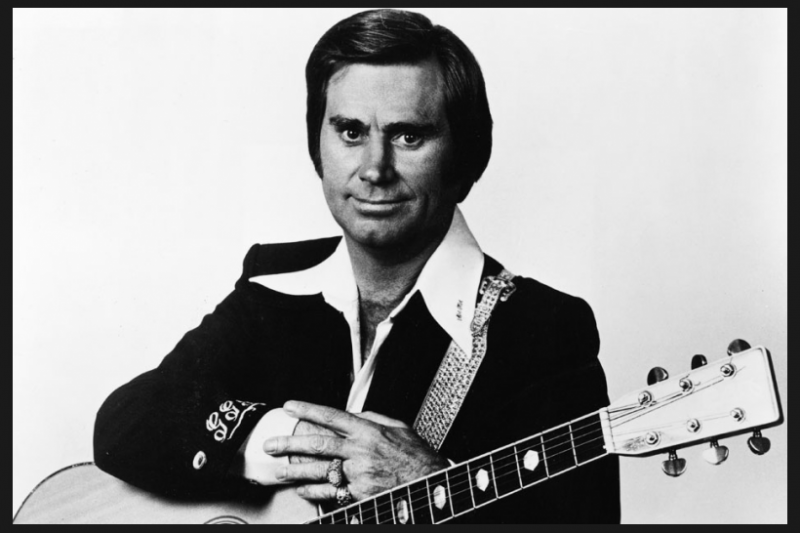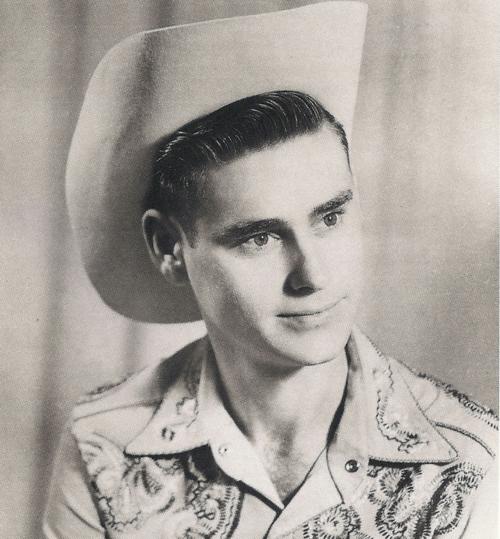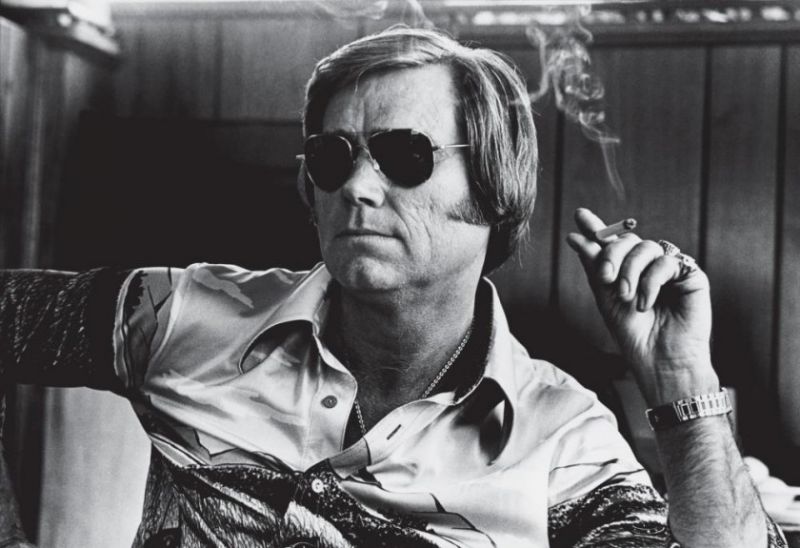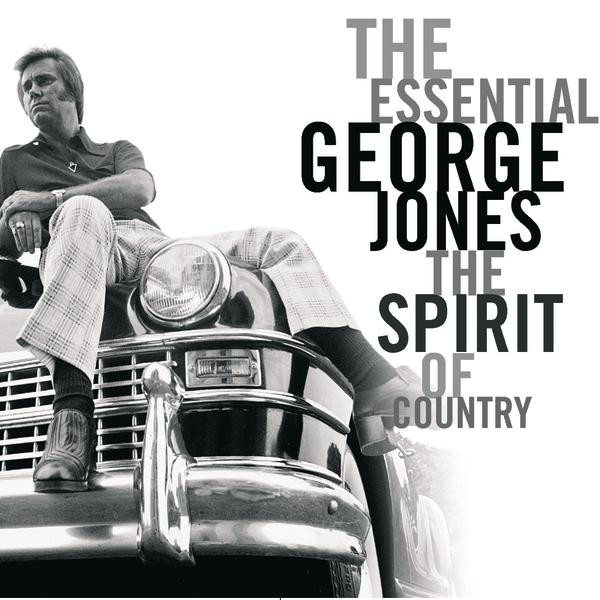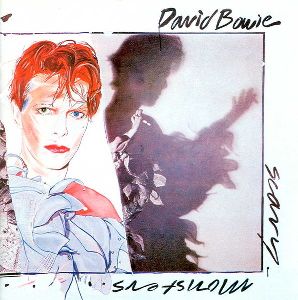By most accounts, George Jones is the finest vocalist in the recorded history of country music.
~Stephen Thomas ErlewineBe real about what you do. Stay true to the voice inside you. Don’t let the “business” change what it is you love because the people, the fans, respond to what is heartfelt. They can always tell when a singer is faking it.
~George Jones
She Thinks I Still Care:
From Wikipedia:
| Birth name | George Glenn Jones |
|---|---|
| Also known as | No Show Jones The Possum |
| Born | September 12, 1931 Saratoga, Texas, USA |
| Origin | Vidor, Texas, USA |
| Died | April 26, 2013 (aged 81) Nashville, Tennessee, U.S. |
| Genres | Country |
| Occupations | singer-songwriter |
| Instruments | acoustic guitar vocals |
| Years active | 1954–present |
| Labels | Starday Mercury United Artists Musicor Epic MCA Nashville Asylum Bandit |
| Associated acts | Tammy Wynette, Merle Haggard |
| Website | www.GeorgeJones.com |
George Glenn Jones (September 12, 1931 – April 26, 2013) was an American musician, singer and songwriter who achieved international fame for his long list of hit records as well as his distinctive voice and phrasing. He is generally regarded as one of the greatest vocalists in the history of country music.
Country music scholar Bill C. Malone writes, “For the two or three minutes consumed by a song, Jones immerses himself so completely in its lyrics, and in the mood it conveys, that the listener can scarcely avoid becoming similarly involved.” Merle Haggard wrote in Rolling Stone magazine that “His voice was like a Stradivarius violin: one of the greatest instruments ever made.” During his life, Jones had more than 150 hits during his career, both as a solo artist and in duets with other artists.
Throughout his long career, Jones made headlines often as much for tales of his drinking, stormy relationships with women, and violent rages as for his prolific career of making records and touring. His wild lifestyle led to Jones missing many performances, earning him the nickname “No Show Jones.” With the help of his fourth wife, Nancy, he has been sober for more than 10 years. Jones has had more than 150 hits during his career, both as a solo artist and in duets with other artists. The shape of his nose and facial features have given Jones the nickname “The Possum.” Jones said in an interview that he has chosen to tour only about 60 dates a year.
–
Jones’s identity was closely tied to his alcoholism. One of the best known stories of Jones’ drinking days happened when he was married to his second wife, Shirley Corley. Jones recalled Shirley making it physically impossible for him to travel to Beaumont, located 8 miles away, and buy liquor. Because Jones would not walk that far, she would hide the keys to each of their cars they owned before leaving. She, however, did not hide the keys to the lawn mower. Jones recollects being upset at not being able to find any keys before looking out the window and at a light that shone over their property. He then described his thoughts, saying: “There, gleaming in the glow, was that ten-horsepower rotary engine under a seat. A key glistening in the ignition. I imagine the top speed for that old mower was five miles per hour. It might have taken an hour and a half or more for me to get to the liquor store, but get there I did.”
From allmusic.com – Stephen Thomas Erlewine:
By most accounts, George Jones is the finest vocalist in the recorded history of country music. Initially, he was a hardcore honky tonker in the tradition of Hank Williams, but over the course of his career he developed an affecting, nuanced ballad style. In the course of his career, he never left the top of the country charts, even as he suffered innumerable personal and professional difficulties. Only Eddy Arnold had more Top Ten hits, and Jones always stayed closer to the roots of hardcore country.
…read more over @ allmusic.com
–
Number one country hits:
- “White Lightning” (1959)
- “Tender Years” (1961)
- “She Thinks I Still Care” (1962)
- “Walk Through This World with Me” (1967)
- “We’re Gonna Hold On” (with Tammy Wynette) (1973)
- “The Grand Tour (song)” (1974)
- “The Door (George Jones song)” (1975)
- “Golden Ring (song)” (with Tammy Wynette) (1976)
- “Near You” (with Tammy Wynette) (1977)
- “He Stopped Loving Her Today” (1980)
- “I Was Country When Country Wasn’t Cool” (with Barbara Mandrell) (1981)
- “Still Doin’ Time” (1981)
- “Yesterday’s Wine” (with Merle Haggard) (1982)
- “I Always Get Lucky with You” (1983)
Check out: List of George Jones’ awards
He Stopped Loving Her Today – Live 1980:
Album of the day – The Essential George Jones: The Spirit of the Country (1994):
Other September 12:
- John R. “Johnny” Cash (February 26, 1932 – September 12, 2003), was an American singer-songwriter, actor, and author, who has been called one of the most influential musicians of the 20th century. Although he is primarily remembered as a country music icon, his songs and sound spanned many other genres including rockabilly and rock and roll—especially early in his career—as well as blues, folk, and gospel. This crossover appeal led to Cash being inducted in the Country Music Hall of Fame, the Rock and Roll Hall of Fame, and Gospel Music Hall of Fame.
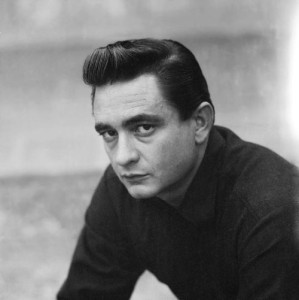
Check out: Johnny Cash profile @ JV
– - Southern Rock Opera is the third studio (fourth total) album by the alt country band Drive-By Truckers. It was a double album and released in 2001 (September 12). Covering an ambitious range of subject matter from the politics of race to 70s stadium rock, Southern Rock Opera either imagines, or filters, every topic through the context of legendary Southern band, Lynyrd Skynyrd. The record was originally self-released on Soul Dump Records. It was re-released on July 16, 2002 by Lost Highway Records. The album was financed by issuing promissory notes in exchange for loans from fans, family and friends of the band.The album’s artwork was done by Virginia artist Wes Freed.
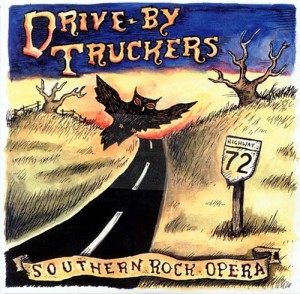 –
– - Scary Monsters (and Super Creeps) is the fourteenth studio album by David Bowie, released in September 1980 by RCA Records. It was Bowie’s final studio album for the label and his first following the so-called Berlin Trilogy of Low, “Heroes” and Lodger (1977–1979). Though considered significant in artistic terms, the trilogy had proved less successful commercially. With Scary Monsters, however, Bowie achieved what biographer David Buckley called “the perfect balance”: as well as earning critical acclaim, the album peaked at #1 in the United Kingdom and restored Bowie’s commercial standing in the United States.
Released 12 September 1980 Recorded February–April 1980 at The Power Station in New York City and Good Earth Studios in London Genre Post-punk, art rock Length 45:08 Label RCA Producer David Bowie, Tony Visconti
– Egil

